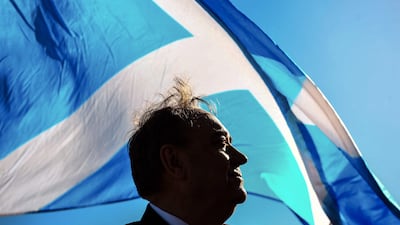For a country of five and a half million people, Scotland has produced some remarkable political figures. Alex Salmond, the former first minister and leader of the Scottish National Party who died suddenly aged 69, was one of those.
Hugely controversial – loved by many, loathed by some – Salmond often outwitted, out-argued and outperformed his political opponents. He earned respect and often friendship. The Conservative MP David Davis, for example, was no fan of Salmond’s core policy of seeking an independent Scotland, but he became a friend who generously paid tribute on Salmond’s passing.
Salmond was first minister of Scotland from 2007. He managed to secure a referendum on Scottish independence in 2014. When the vote was lost by 45 per cent to 55 per cent, he stepped down as party leader. Despite that failure, it is no exaggeration to say that Salmond took Scotland closer towards independence from the UK than any politician in recent history – and by “recent” in terms of our ancient country, I mean since 1707. That was the year of the Union of the English and Scottish Parliaments.
Scotland, therefore, remains part of the UK for the foreseeable future, although polls suggest more than 40 per cent of Scottish voters still would like Scotland to be an independent country within the EU.

The past few years, however, saw Salmond split from the SNP amid scandals and bitterness.
Back in 2014, he handed over power to his former deputy Nicola Sturgeon but the two eventually had a very public falling out. The SNP endured a number of scandals, investigations and political failures. Salmond himself faced a series of legal battles, leading to his arrest in 2019. He was charged with 14 sexual offences. He was eventually acquitted on all but one charge, and on that charge the jury reached the uniquely Scottish verdict of “not proven”. That does not amount to a conviction, but the process revealed some very unpleasant tales of behaviour at the highest levels in Scotland during his time as first minister.
Controversially, and perhaps unwisely, Salmond also broadcast for a time on RT, the Russian state TV channel. He left the channel after Russia’s invasion of Ukraine in 2022. The tributes, however, have come not merely from political friends, but from opponents, critics and even King Charles himself.
In a message issued by Buckingham Palace, King Charles said: “My wife and I are greatly saddened to hear of the sudden death of Alex Salmond.” Prime Minister Keir Starmer called him a “monumental figure” who “leaves behind a lasting legacy”, as first minister of Scotland. This is undeniably true. Whatever you think of his politics, or his flaws, Salmond was what Scots sometimes call a “man of parts” – a talented or gifted man with many different attributes.
When I teased him on television about the fact that, as a Scot living in England, I could not vote in his independence referendum, he answered very clearly. But after we finished the live interview, he put an arm around me and said that if I wanted to vote I should “buy a hoose” – Scottish for house – back in Scotland. Of course, he was correct. Only people residing in Scotland should be able to vote on Scotland’s future, but his solution – that I should come back to live in my home country – was typically Alex.

It is laughter and joking amid the serious business of politics that I most remember him for. We had humorous discussions about Scottish football – he loved the Edinburgh team Hearts – but he also reflected on the often-unpleasant historical sectarianism involving Protestant and Catholic supporters of Rangers and Celtic. Perhaps what I most admired was his optimism and stubbornness. The Scottish word is “thrawn” – an almost unreasonable conviction that ultimately you are in the right. Salmond never gave up, even in times of great difficulties.
A few months after the failure of the 2014 independence campaign, during the 2015 general election, I went to meet him for a long private chat. He had – to be polite – a difficult relationship with the BBC, where I worked. But when I filmed with him, he would instruct some of his supporters that whatever they thought of the British Broadcasting Corporation, my TV crew was to be treated with respect. And we were. He was to me generous, kind and good company.
After filming on one occasion, he and I and a couple of his SNP colleagues sat down together. I suggested that independence as an idea was dead for a generation. In typical Salmond fashion – he had a talent for memorable theatrical gestures – he opened his bag. He said, “here’s a wee present”. It was one of the first copies of a new book he had written in the aftermath of the failed independence campaign. He pointed at the title and we both laughed. The title of his book – and indeed the epitaph of Alex’s life – is The Dream Shall Never Die.
May he rest in peace.


